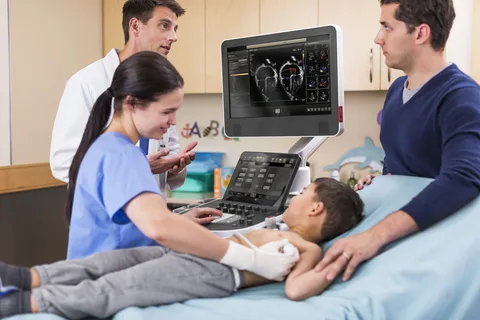When it comes to diagnosing kidney-related issues, the renal artery Doppler ultrasound stands out as an essential tool. This non-invasive imaging technique plays a crucial role in assessing blood flow in the renal arteries, providing valuable insights into kidney health. In this blog, we will explore the significance, procedure, and implications of renal artery Doppler studies in a way that is informative and engaging.
What is Renal Artery Doppler?
Renal artery Doppler is a specialized ultrasound test that measures blood flow in the renal arteries, which supply blood to the kidneys. This test evaluates not just the anatomy of the renal arteries but also their function. By assessing blood flow patterns, healthcare providers can identify conditions like renal artery stenosis (narrowing) or thrombosis (blockage).
Why is it Important?
Understanding renal blood flow is vital for diagnosing various kidney-related issues. Any abnormalities in blood flow can lead to significant complications, including hypertension and kidney failure. Moreover, early detection through a Doppler study allows for timely intervention, improving patient outcomes.
Indications for a Renal Artery Doppler Study
Healthcare providers may recommend a renal artery Doppler study for various reasons:
- Suspected Renal Artery Stenosis: If a patient has resistant hypertension, doctors often investigate the possibility of narrowed arteries affecting blood flow to the kidneys.
- Chronic Kidney Disease (CKD): In patients with CKD, a Doppler study helps assess blood supply to the kidneys, guiding treatment decisions.
- Evaluation of Renal Transplants: For kidney transplant recipients, monitoring blood flow in the renal artery is crucial to ensure the transplanted organ’s viability.
- Preoperative Assessment: Before certain surgical procedures, a Doppler study can evaluate renal artery anatomy and blood flow, aiding surgical planning.
The Procedure: What to Expect
If your healthcare provider recommends a renal artery Doppler study, you might wonder what the process involves. Here’s a step-by-step breakdown:
Preparation
Generally, there is minimal preparation required for this test. However, your doctor may ask you to refrain from eating for a few hours prior. Always follow specific instructions given by your healthcare provider.
During the Test
- Positioning: You will lie on an examination table, often on your back. The technician may adjust your position for optimal imaging.
- Application of Gel: The technician applies a water-based gel to your abdomen. This gel enhances the transmission of sound waves, allowing for clearer images.
- Ultrasound Probe: The technician uses a small handheld device called a transducer to send sound waves into your body. As the sound waves bounce back, they create images of the renal arteries.
- Doppler Assessment: To evaluate blood flow, the technician will switch to Doppler mode. This mode measures the speed and direction of blood flow, highlighting any abnormalities.
- Duration: The entire procedure usually lasts between 30 minutes to an hour, depending on the complexity of the case.
After the Test
Post-procedure, you can typically resume normal activities immediately. There are usually no side effects from the test. However, your healthcare provider will discuss the results with you during a follow-up appointment.
Understanding the Results
After the renal artery Doppler study, your healthcare provider will analyze the findings. Here’s what you might encounter in the results:
Normal Results
A normal Doppler study indicates adequate blood flow to the kidneys, suggesting that the renal arteries are healthy and free from significant blockages or stenosis.
Abnormal Results
Conversely, abnormal results may indicate various issues, such as:
- Renal Artery Stenosis: A narrowed renal artery, which can cause reduced blood flow to the kidney, leading to hypertension and kidney damage.
- Thrombosis: A clot blocking the renal artery can severely affect kidney function and requires immediate attention.
- Increased Resistance: Elevated resistance in the renal arteries may point to systemic issues, such as hypertension or other vascular diseases.
Benefits of Renal Artery Doppler
The renal artery Doppler test offers several advantages:
- Non-invasive Nature: Since this is a non-invasive procedure, it eliminates the need for surgery or invasive techniques, reducing patient risk.
- Quick and Painless: Patients typically find the procedure quick and comfortable, with no recovery time needed.
- Real-time Assessment: The Doppler technology provides immediate information about blood flow, allowing for timely medical decisions.
- Diagnostic Accuracy: Renal artery Doppler studies boast a high accuracy rate in identifying vascular issues related to kidney function.
Limitations of Renal Artery Doppler
While the renal artery Doppler is a valuable diagnostic tool, it does have limitations:
- Operator Dependence: The accuracy of the results can depend significantly on the technician’s skill and experience.
- Obesity and Bowel Gas: Excessive body fat or bowel gas can interfere with image quality, potentially complicating the evaluation.
- Interpreting Complex Cases: In some instances, results may not provide a definitive diagnosis, necessitating additional tests, such as CT angiography or MRI.
Future Trends in Renal Imaging
As technology advances, the future of renal imaging, including Doppler studies, looks promising. Innovations in ultrasound technology may enhance the accuracy and effectiveness of renal artery evaluations. Additionally, integrating artificial intelligence into imaging can help streamline the analysis process, providing even more precise diagnostic capabilities.
Conclusion
In summary, the renal artery Doppler study serves as a critical tool for healthcare providers in assessing kidney health. By offering a non-invasive, efficient means of evaluating blood flow, it helps in the early detection of conditions that could jeopardize renal function. If you suspect any issues related to your kidneys or have risk factors for renal artery diseases, consult your healthcare provider about the possibility of undergoing a renal artery Doppler study. Early intervention can lead to better management of kidney health and overall well-being.
By understanding the significance, procedure, and implications of renal artery Doppler studies, patients can take a proactive role in their healthcare journey, ensuring they stay informed and engaged in their treatment options.
See more:
https://mimedia.in/read-blog/7395_unlocking-the-potential-of-real-time-doppler-ultrasound-in-medical-diagnostics.html

